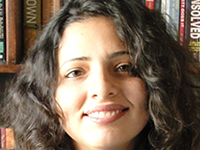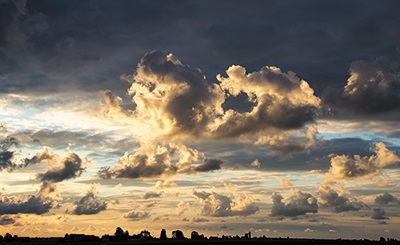
‘I often return to the epiphany of moment’
The poems selected here are from my next collection, which is perhaps a series of questions about language, gender and belonging. I say ‘perhaps’ because uncertainty, even suspicion, is at the heart of these poems. Over the last few years my writing has become wary about answers;I find more satisfaction in arriving at the right questions.
When cable TV first came to India and cartoons replaced grandmothers as babysitters, I grew up watching Tom chase Jerry. I remember a scene where Tom is chasing Jerry on a roof and gets distracted. Not realizing that the roof has ended, Tom continues running. Soon he senses something is different. Still looking around, Tom pats the air with his paws. Once. Twice. It doesn’t feel right. Tom looks down, and zoop! He falls through the air. While writing, I often return to the epiphany of that moment. The cat does not fall off when the roof ends; he falls off when he realizes the roof has ended. My poems are moments of walking off the roof. I want to examine the spaces where the ground under our feet — social, geographical, political, linguistic — opens up. The moment of recognising we’re walking on air.
In some ways, the poems are in conversation with the very things that made them: ancestors, history, gods and language. But it took a while to get there. I was initially distracted by the noisier versions of these poems. Through various drafts, I found that my work does not want to fit into complex identities but, more difficultly, to transcend them. To transcend not just labels and histories but even the subtler trappings of language and time.
It might be a while before we get there. Meanwhile, I must let the poems say the rest.
The Names of Things
are ancient
pillars rooted in histories
of revived gods and forgotten
godliness, of owning, fragmenting
lineage and language
are stories
distilled into letters
some bent, some proud, with bindis
on their heads, all waiting to burst
through their seams of ink
are sensual
like aafreen or silhouette
the double t of butter
melting, sizzling, dissolving
in the bed of a warm mouth
are counterfeit
like rice, containing ice
but none of the soft, gelatinous
nourishment of a pulao
garnished with the banter of cousins
are borders
past which I seek
that nounless language
where north is to find
where leg is to walk
where even god is a verb
Why the Elephant Isn’t Big
After my own Wordsworthian walk
I will leave the flowers unplucked
by syntax. So much
of so much is prismed by language,
refracting into seven shades of something
half-endearing, half-flawed that
it must be human. After all, the daffodils
aren’t golden to the kitten
who can only see blue and green,
the clouds aren’t lonely to the birds
who know to make friends midsky.
And I’m convinced when cats
consent to create a grammar
it will be full of possessives, these creatures
who graciously adopt the world.
So as I throw the ball to my niece
I tell her why the elephant isn’t big
— it’s the normal size of an elephant —
just as the ant isn’t small and the giraffe
isn’t tall. Everything, she asks, breathless,
is its own normal? I shrug so she may
learn to mistrust what adults believe. Mean
while what can anyone honestly say?
The cloud is. The flower is. She is.
Anything after that is not them.
It’s me.
Self Portrait: Neti, Neti
‘To know what you are, you must first investigate and know what you are not.’ – Nisargadutta ‘I Am That’
My skin is transparent
as the wind. Come,
look closer,
look better.
And chant, as you approach –
One: not another woman
Two: not another other woman
Three: not woman, not man, not anything third
Four: not flower, not goddess, not homemaker,
not home-breaker, not reformer,
not cheerleader, not temptress,
not sorceress, not bud, not thorn,
not the name for breath or death,
not sister, not bhabhi, not word-slinger,
not middle-finger, not girl-next-door,
not woman-on-top, not womb,
not barren.
Five: not roots, not country, not language
Six: not metaphor
Seven: not, not, not.
And if you wade past
this cacophony of labels
pinned to my skin,
watch yourself in my eyes.
Reborn.
Hologram
They insisted the tree was aging
but to our child-eyes
the world appeared vintage anyway,
framed by fading yellow
boughs. So when the tree fell
to the wind
(perpetual enemy of the old)
we gaped at the pulsing web
of roots that held
surprised species together.
Moles and worms blinked
their blindness at the sparrows
that had once nested
on higher floors.
After the crash, everything fell
silent. And cacophonous.
Like the world
had ended, but no one
had sent the memo.
They spoke of how the tree
bore flower and fruit
but I now only remember
how it held a tickle
in its leaves,
an almost-trembling,
like the beards
of a certain generation of men.
We poked through the holes
in its brown skeleton,
thrilled and terrified by death
sprawled around our feet.
Yellow is the colour
of shock.
They did not notice us enough
to explain that our confused
grief was wasted.
The tree simply continued
after the women
took away its arms
to light their fires.
Once home to butterflies,
now to caterpillars,
leaf turning to mulch
flower to fossil
nectar to oil.
For the rest of the week
we ran through
its once-spot
as if we were entering
a hologram,
the tree as present as breath,
a great-grandmother
whispering in our ears
the story of how death
is yet another kind
of life.
We are Born with the Dead
See, they return, and bring us with them.
— T. S. Eliot ‘Four Quartets’
And the seed stands in promise
of the tree within it,
the egg stands in promise
of feathers, flight and skies,
the mud, of clay and cup.
We exist not only as manifest
but as maybe.
Refrigerators borrow their hum
from waterfalls, deafening
chutes of molten current.
And in the sand bordering
the oceans, we draw
blueprints of silicon chips.
My skin, hair and sweat
bear the DNA that make their way
into water and weed, returning
as takeaway meals that sculpt
my skin, hair and sweat.
Sometimes when the world is ablur
and nothing knows
its place anymore, I like to imagine
I’m weaving my way
in and out of every pulse
on this blue button,
looking under rocks
for the last place
I left myself.
The Note on Poetics and the poems are part of our Poetry Special Issue (January 2022), curated by Shireen Quadri. © The Punch Magazine. No part of this essay or the poems exclusively featured here should be reproduced anywhere without the prior permission of The Punch Magazine.
More from The Byword
Comments
*Comments will be moderated
Wonderful! In the warp and the weft of her words, Saket has captured the essence of just being! Brilliant!
Daisy Navdar
Jan 25, 2022 at 04:26










